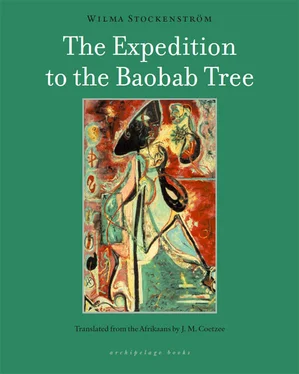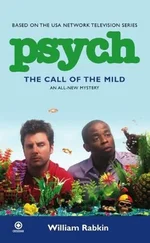As an apparition I throve, became rounded and plump again from eating fungi and carrion flower stalks, python flesh, marulas, livelong berries, waterbuck liver. Whatever a winter and a summer had to offer to the eye and gathering bag and the bow and arrow of the little people, I too was fed on. There was no question of hardship any more, rather one of lazy overabundance.
Whom to thank, I sometimes ask myself. My water spirit is silent. So I thank the honey-bee. I thank the tree that houses him. I thank the earth that gives the tree its footing, with great difficulty, because it grows upside down. I thank the rain that descends to the very roots of the tree so that it can drink water and grow leaves and flowers. But the water spirit is silent. Baobab around whom the bees dance by day and around whose sensitive flowers unfolding like moons so many bats flap by night, in whose forks the rain pours rainwater for me, my water spirit is silent about you. Once I found an injured bat on the ground beside the daylight-filled crevice. At first I thought it was a funny flat frog shuffling backwards out there. Then I noticed it had fur. Then I saw the ears. And went down to the water. When I came back it was gone.
I searched the place where I had picked up those first beads. Continually, naggingly I searched.
The bat was gone. A necklace of ostrich eggshell fragments the color of wild pear blossoms and a handful of medlars were waiting for me.
Then latish one afternoon I discovered the pale knot of a rock fig in an overgrown cleft, and overhastily climbed the stone ridges, hauled myself up on loose hanging roots, and arrived on a small plateau. The steep side I had scrambled up was at an angle to both sunrise and sunset and offered a view across a long, virtually empty slope with clumps of trees. A few giraffes. The dust of a mixed herd of snorting, barking wildebeest and zebra. At the time I noticed nothing more. A flight of birds, yes, that too, swiftly dissolving into the distance. The wind was present everywhere. It rustled steadily as if it were the companion of silence. That was all I found in a thorough investigation of the plateau: wind and the background of wind, silence. I made believe this was the guardian who had wiped out everything, and woe to him who came sniffing around. Why scratch open, dig up, expose, reflect and deduce? Let be, just let be. Here there had been perhaps.
A city, perhaps, with ruler and subjects. I did not know what they came here to seek, what made them build their houses here of all places, with a view over endlessness, and whether they knew of the great sea that lapped around the horizons, and whether they imagined their various gods in the heavenly bodies or elsewhere, whether they observed ceremonies in their honor from which they departed, eyes glassy with faith and hearts full of good intentions, and whether they knew beforehand of their certain death. Or was death a game of chance to them, sometimes complicated by sicknesses, sometimes coming at a stroke, but in any event the actual beginning of life without the nuisance of a body and the time-consuming needs thereof, and if death is life, then they still live. Here. Right here.
The wind died down. In the unbelievable silence one of the big stones rolled down the cliffside, bouncing, leaping as if performing a trick, fantastic and soundless, and came to rest on the level below. The soundlessness gave me a fright. Now I no longer heard anything. Suddenly I knew that if I were now to speak, something tremendous would happen. The dead would arise, or no, they would become visible to me, and time would somersault, the earth would tilt, capsize, and hang upside down in the direction of limitless darkness and the spirit of the water would voyage into eternal space and forever be lost.
Then I felt something creeping in my ear. It tickled and itched and I shook my head. An ant. Something. An insect. I crushed it with my finger. And as if I had spent some time in a swoon, I now noticed that the sky had clouded over and that it was going to rain at any moment. Pell-mell I cleared out, possessed by fear and determined to get to the baobab before the lightning began to flash, but above all determined to be back in time in the time in which I belonged, for as I ran and sometimes stumbled too I felt behind my back another world growing, I felt that what had existed was extending its realm faster and faster, and felt that soon, in the very act of running, I would move in a wholly other time.
I reached the baobab with beating heart and a stabbing pain in the spleen that doubled me over, and I squatted in the opening and saw the rosette patterns that first raindrops make as they hit the dust.
So I yielded to the powers of my environment, or, to put it less despondently, I learned to live with them, as I learned to live with the veld and the animals and insects, with the choice of paths in reality and in my sleep, and with the presence of people who kept me apart. It is a strange experience to share a life without contact, and I often ask myself whether they are displaying charity towards me or bringing tribute. I try to behave fittingly. Acknowledge to myself that there is nothing for me to do but accept my fate as pampered captive and show myself grateful accordingly. It is as if the presence of others aggravates my loneness, as if the distance between myself and other people has become greater now that they exist in tangible proximity. I see them walking in the distance, I see girls playing with a monkey orange, throwing it back and forth to each other, I see women carrying babies on their protruding buttocks, men with wrinkled stomachs and legs thin as sticks, all of them yellow as a tortoise’s belly, and I hold my hand over my mouth to prevent myself from calling someone nearer. I hear the click sounds they utter, I mutter something to myself that sounds like the language of my childhood days. Words that had got lost take on dim shape. Mother I see before me, father, brothers, sisters. I see huts and very high trees with trunks pleated like billowing skirts and green foliage. Mother I see again. Warmth and softness, a slimness, long breasts with sturdy nipples. Voices I hear vaguely and other noises too, a chopping, a crackling. I remember suddenly dogs that never bark, and noisy apes, and there was gaiety, I remember, when meat was portioned out, ape-meat too, yes, and I had had a doll made of bark fiber, the doll had beads around its neck, the head was a club, and I had the doll with me when everyone fled from their huts into the dense underbrush, my mother yanked me by the arm but she was killed, her head was split open and I was jerked out of her grasp and driven into a knot with other women. There were a whole lot of male captives too. I held on to my doll. I kept it with me in my arms. We traveled and traveled and then came to a village. The male captives were herded together and something was done to them. Later we set off and traveled further and further and came to a city on a terribly big, immeasurably broad dam, blue from this end to the far end.
Now I have the name for everything: slave, castration, commerce, coastal city, sea, forced labor. Yes, now I have it all.
I have the name and I am not listened to. There is nothing I can do with the names. They are nothing but rattles.
Borne from far on the wind I hear the little people making music. The sounds seem to me like beetles jumping over a fire. Also I hear them singing and clapping their hands.
Now I will force a confrontation.
When they next come to pick baobab seeds to suck the sour white flesh off the stones, I vow — then. Then I will confront them naked. Then I will undress. I will lay aside my skin apron and my skin cloak with the spring hare bones, as well as the necklace of ostrich eggshell fragments, and I will confront them, challenging them, though with my challenge tempered with acquired grace, shy but queenly, seductive but aloof; and I will look them right in the eyes and force them to look right back at me and acknowledge me, as a human being and nothing more than a human being. That is all I am.
Читать дальше












